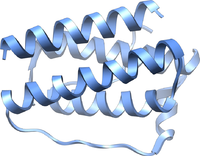
Photo from wikipedia
Abstract Metabolic demands of modern hybrid sows have increased over the years, which increases the chance that sows enter a substantial negative energy balance (NEB) during lactation. This NEB can… Click to show full abstract
Abstract Metabolic demands of modern hybrid sows have increased over the years, which increases the chance that sows enter a substantial negative energy balance (NEB) during lactation. This NEB can influence the development of follicles and oocytes that will give rise to the next litter. To study effects of a lactational NEB on follicular development, we used 36 primiparous sows of which 18 were subjected to feed restriction (3.25 kg/day) and 18 were full-fed (6.5 kg/day) during the last 2 weeks of a 24.1 ± 0.3 day lactation. Feed restriction resulted in a 70% larger lactational body weight loss and 76% higher longissimus dorsi depth loss, but similar amounts of backfat loss compared to the full fed sows. These changes were accompanied by lower plasma insulin-like growth factor 1 (IGF1) and higher plasma creatinine levels in the restricted sows from the last week of lactation onward. Ovaries were collected 48 h after weaning. Restricted sows had a lower average size of the 15 largest follicles (–26%) and cumulus–oocyte complexes showed less expansion after 22 h in vitro maturation (–26%). Less zygotes of restricted sows reached the metaphase stage 24 h after in vitro fertilization and showed a higher incidence of polyspermy (+89%). This shows that feed restriction had severe consequences on oocyte developmental competence. Follicular fluid of restricted sows had lower IGF1 (–56%) and steroid levels (e.g., β-estradiol, progestins, and androgens), which indicated that follicles of restricted sows were less competent to produce steroids and growth factors needed for oocytes to obtain full developmental competence. Summary Sentence Premating feed restriction results in lower oocyte developmental competence, which might be explained by reduced follicular steroid and growth factor production.
Journal Title: Biology of Reproduction
Year Published: 2019
Link to full text (if available)
Share on Social Media: Sign Up to like & get
recommendations!